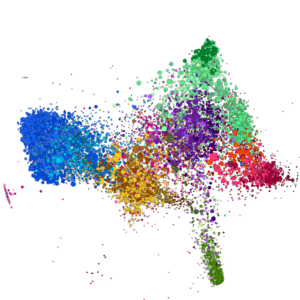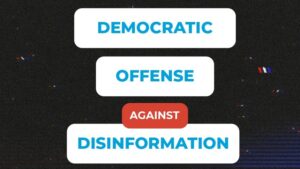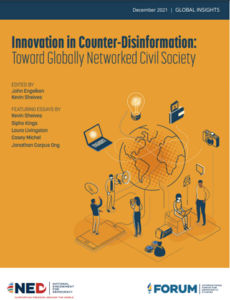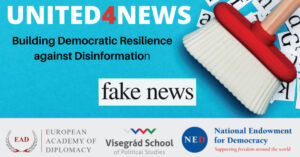We have been looking for the solution to disinformation in the wrong place, according to a leading analyst.
Civil society, not governments or social media companies, can best diminish disinformation. But these civil society organizations need equipping, and their tools need sharpening. A powerful, networked disinformation threat should be met with a powerful, networked response, argues Kevin Sheives, the associate director of the International Forum for Democratic Studies at the National Endowment for Democracy (NED).
Civil society organizations designed to counter social media disinformation – such as Taiwan’s Doublethink Lab – are sprouting up nearly everywhere in the world, even amid threats of increasingly closed or illiberal societies and authoritarian pressures, harnessing the power of technology and advanced media-monitoring tools, he writes for War on the Rocks:
- The Australian Strategic Policy Institute used an algorithm derived from third-party companies to map a wide range of inauthentic accounts coordinated with Chinese Communist Party officials and outsourced “disinformation-for-hire” firms.
-

Graphika
U.S.-based research firm Graphika (right) used its in-house advanced machine-learning algorithm to map disinformation networks, such as one amplifying disinformation about COVID-19 and harassing public health officials.
- Slovakian think tank Globsec developed polling, focus groups, and surveys to measure the vulnerability of regional democracies to foreign influence operations.
- Code for Africa developed PesaYetu, a data visualization tool for journalists and activists to hold local officials accountable for disinformation they peddle about governance and city services.
- In the Czech Republic, self-titled “elves” are intentionally using decentralized groups of citizens to fight online disinformation from Russia and elsewhere.
- In a nod to the Daily Show with Jon Stewart, the Center for International Media Assistance documented satirists and humorists throughout the world exposing disinformation by laughing their way through it with their audiences.
- Organizations like 263Chat, AfricaCheck, and the Continent are using chatbots, on-demand podcasts, and new business models to infuse independent media voices and fact-checking into closed messaging apps, like WhatsApp, that are beginning to populate Africa’s social media landscape.
- The Atlantic Council’s Digital Forensic Research Lab has trained analysts (called “Digital Sherlocks”) on five continents to detect and monitor disinformation in their online environments.
- Code for Africa has spawned new localized digital and civic tech initiatives in 20 countries on the African continent, and equipped newsrooms with digital forensic analysis and cybersecurity training for outlets under pressure from illiberal or authoritarian governments.

CEPA
From foreign influence operations disrupting democratically-held elections to anti-vaccine conspiracies undermining global public health, disinformation has drawn attention to the many ways technology engenders new and complex challenges for civic life, Stanford’s Center for Democracy, Development and the Rule of Law adds. In the above talk, CDDRL Postdoctoral Fellow Samantha Bradshaw explores the role of identity-based propaganda in contemporary influence operations and its consequences for democracy and civic life.
A number of European countries are taking steps toward a “whole-of-society” approach that acknowledges the role of private citizens and the private sector in keeping countries safe, Elisabeth Braw, a Senior Fellow at AEI and the author of The Defender’s Dilemma: Identifying and Deterring Gray-Zone Aggression, writes for POLITICO;
- Just this month, Sweden launched a government agency for psychological defense, which will counter disinformation and make the population more resilient to it.
- Last year, Britain explicitly announced it was shifting to a whole-of-society approach to national security. Among its first steps: plans to launch a civil reserve, analogous to military reserves, of experts in fields from cyber to healthcare who will volunteer their services in crises.
- In 2020 Latvia published a crisis-preparedness leaflet called “72 Hours: What to do in case of crisis.” The idea, the country’s defense minister wrote at the time, is to “[prepare] society for catastrophes we cannot specifically predict.”
- The Czech Republic launched joint military-industry gray-zone exercises, in which the armed forces and companies from every sector team up to practice reacting to different forms of aggression below the threshold of war, from cyber attacks to supply chain disruptions to coercion of companies.
 Civil society organizations are sophisticated, nimble, and collaborative, as a recent essay series confirmed. But Western funders, platforms, and governments should play to their strengths in this global network: their size, financial and human resources, analytic capabilities, and global reach, the NED’s Sheives observes:
Civil society organizations are sophisticated, nimble, and collaborative, as a recent essay series confirmed. But Western funders, platforms, and governments should play to their strengths in this global network: their size, financial and human resources, analytic capabilities, and global reach, the NED’s Sheives observes:
- First, local civil society groups need more data access. … Existing initiatives should be scaled up in order to reach deeper into the Global South. Platforms should further expand the data-sharing partnerships that civil society organizations have called for and find ways to provide more immediate, real-time access to threat networks that Facebook and other platforms are increasingly disclosing. … Additionally, new government counter-disinformation and intelligence agencies have a wealth of data and tools for analysis that need to be unlocked for civil society…
- Second, local civil society groups need more training in order to serve as more credible messengers of truth. … U.S.-based organizations have published helpful guides and best practices for other groups, but local organizations need even more direct support, curricula, and education. A survey of global counter-disinformation organizations by researchers at the National Endowment for Democracy and the Oxford Internet Institute found that many counter-disinformation groups outside of America and parts of Europe lacked training in the data and social science fields that their Western counterparts had….
- Third, funders need to act like venture capitalists. … Like disinformation operations themselves, measuring the impact of counter-disinformation efforts can be difficult, and the payoff can sometimes come in the long term. Micro-managing funded projects from afar in order to produce X outcome from Y program can lead to poor results and even distrust between funders and local organizations. Funding needs to be long-term and flexible so local organizations can adapt to new threats and sustain operations in more closed, authoritarian settings.
- Finally, funders, both new and established, need to find ways to avoid fostering an overly competitive landscape among civil society organizations. A more formal mechanism could help provide some of the above-mentioned resources to groups around the world in a more systematic fashion. RTWT
 Disinformation and Its Threat to Democracy is the focus of a virtual Princeton seminar with Danny Rogers, the co-founder and CTO of the Global Disinformation Index, a non-profit focused on catalyzing change within the tech industry to disincentivize the creation and dissemination of disinformation. Tuesday, February 1, 2022 12:30 pm – 1:30 pm. Click here to join.
Disinformation and Its Threat to Democracy is the focus of a virtual Princeton seminar with Danny Rogers, the co-founder and CTO of the Global Disinformation Index, a non-profit focused on catalyzing change within the tech industry to disincentivize the creation and dissemination of disinformation. Tuesday, February 1, 2022 12:30 pm – 1:30 pm. Click here to join.
How can AI tools help detect “deep fakes” and other forms of coordinated inauthentic behavior online? The Yale Cyber Leadership Forum asks. How can democratic policymakers and social media companies counter the threat of disinformation and online extremism without impinging on freedom of speech and other fundamental freedoms? What are the most effective techniques for educating citizens to the threat of disinformation, and developing counter-narratives to combat conspiracy theories? Yale Cyber Leadership Forum | Disinformation and the Future of Democracy. Friday, March 4, 2022 9:00 AM – 12:00 PM RSVP
The China Index is a project under China In The World, a Double Think Lab-led international network established to address the challenges posed by the People’s Republic of China’s (PRC)’s growing global influence by bringing together stakeholders to investigate PRC’s influence operations and disinformation strategies.
51 countries have been covered in the pilot edition of the China Index, and it is now looking for new regional partners to conduct the research.
- The deadline for submission is February 7, 2022.
- The selected partner will be provided USD$3,400 per country. To join the open call, you can find further information here.
- Please submit your application at this Google form here.
Civil society can step into the breach to tackle disinformation, both to warn governments of the perils of such laws & to check social media firms’ power, @ThinkDemocracy‘s @KSheives writes in a must-read for @WarOnTheRocks https://t.co/ZiaSVtGOiH
— Democracy Digest (@demdigest) January 20, 2022







